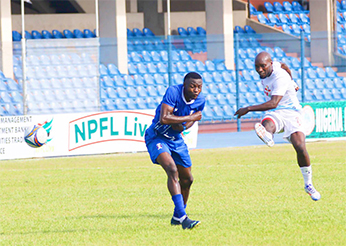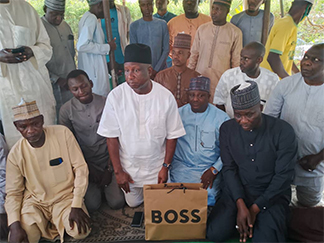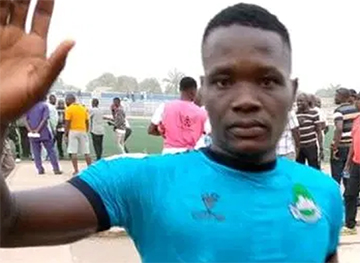Nigerian Football
NORTH WEST, SOUTH EAST CLASH IN NFF/ZENITH BANK U15 FINAL
A week of exciting youth football in the ancient city of Kano will witness the grand finale in Lagos on Tuesday with the U15 final of the NFF/Zenith Bank Future Eagles Championship at the Agege Stadium.
Tuesday will be exactly a week on one year that the finals of the inaugural edition of the competition (U13 and U15) took place at the Onikan Stadium, with South West emerging champions in the U15 category with a 2-0 defeat of South East, while South East defeated South South 4-2 in the final of the U13 category.
This year, an enterprising North Central squad overcame equally ambitious South West team 4-2 on penalties in Kano to emerge champions of the U13 category.
North West and South East take to the Agege Stadium turf on Tuesday afternoon for the intermediate honours, with last year’s runners-up South East determined to take the step up to the champions’ podium this time.
Following last year’s inaugural competition that took place in Ijebu-Ode and Lagos, NFF Technical Director, Bitrus Bewarang told thenff.com: “I am delighted with the entire good job done by the NFF Youth Football Committee, headed by the NFF 1st Vice President, Seyi Akinwunmi.
“I saw excellent football by young, talented and ambitious kids. On the evidence of what I saw in Ijebu-Ode and Lagos, I believe that in the nearest future, we would be making use of very young players, in the mould of Kelechi Iheanacho and Alex Iwobi, for the Super Eagles.”
The former Super Eagles’ Assistant Coach also hailed competition sponsors Zenith Bank International PLC, assuring the bank that its name would be etched in gold once the prodigies start making waves in the NPFL, Super Eagles and top Leagues overseas.
“The bank has put its money in the right place, and I am using this opportunity to call on other big players in Corporate Nigeria to embrace sports, because by embracing sports, they are assuring the future of the youth.
“Certainly, the NFF/Zenith Bank Future Eagles Championship is a welcome development. I want to implore the bank not to rest on its oars, but rather guarantee that the competition has come to stay as an annual carnival for the young and determined boys from the grassroots.”
Zenith Bank’s chieftains are enamoured at the essence and glamour of the competition, and will again storm the Agege Stadium in full force on Tuesday.
NFF President Amaju Pinnick, 1st Vice President Seyi Akinwunmi (who is the Chairman of the NFF Youth Football Committee), a number of NFF Executive Committee members, NFF General Secretary Mohammed Sanusi, some top officials of the Lagos State Government, a couple of NFF Management officials, as well as members of the NFF Youth Football Committee will also be in attendance.
RESULTS (U13)
South South 3 North East 0 (W/O)
North Central 2 North West 1
North East 0 South West 3 (W/O)
North West 3 South East 0 (W/O)
South West 0 South South 0
South East 0 North Central 3 (W/O)
South West 2 North West 1
North Central 2 South South 1
FINAL
South West 2 North Central 4 (after penalties)
RESULTS (U15)
North East 2 South South 3
South West 0 South East 2
South South 2 North West 4
South East 4 North Central 0
North West 1 North East 0
North Central 1 South West 3
North West 4 South West 3
South East 4 South South 1
FINAL
North West Vs South East
Nigerian Football
Remo Stars maintain ‘7Up’ lead over Rivers United

Remo Stars are coasting to what will be their greatest moment ever, a win of the Nigeria Premier Football League title, as they recorded a 1-0 win over Shooting Stars in Ibadan in a match played behind closed doors.
In doing so, they achieved their sixth double of the season, having earlier beaten Shooting Stars in the first stanza of the league.
They maintained the seven-point lead over second-placed Rivers United, who also beat Sunshine Stars 1-0 in Port Harcourt.
After a ding-dong affair, Alex Oyowah scored the vital goal for Remo Stars from a right-wing cross from Ismail Sodiq.
In another match, Ikorodu City continued to work tenaciously to obtain a continental ticket as they held El Kanemi to a 1-1 draw.
SUNDAY RESULTS
- El Kanemi 1-1 Ikorodu City
- Niger Tornados 1-1 Bayelsa United
- Heartland 0-0 Kwara United
- Plateau United 1-0 Akwa United
- Rivers United 1-0 Sunshine Stars
- Shooting Stars 0-1 Remo Stars
- Bendel United 1-1 Nasarawa United
SATURDAY
- Katsina United 0-0 Abia Warriors
- Enyimba 2-1 Kano Pillars
- Lobi Stars 2-4 Enugu Rangers
Join the Sports Village Square channel on WhatsApp: https://whatsapp.com/channel/0029Vaz7mEIGk1FxU8YIXb0H
Nigerian Football
NFF, NPFL pay condolence visit to family of late match commissioner, Mohammed Sani Abdul

Top officials of the Nigeria Football Federation and the Nigeria Premier Football League on Thursday paid a condolence visit to the family of deceased NPFL match commissioner, Mohammed Sani Abdul, who died on Wednesday, 9th April 2025, on his way back to Maiduguri from Jos, where he had gone to commission an NPFL match.
Abdul, who was also an auditor at the University of Maiduguri Teaching Hospital, had served as match commissioner at the game between Plateau United and Kwara United in Jos the previous day.
Gbenga Elegbeleye, 2nd Vice President of the NFF and also Chairman of the NPFL, was led to the family house of the late Sani Abdul, located inside the Staff Quarters of the University of Maiduguri, by Member of the NFF Executive Committee and Chairman of the NFF Match Commissioners’ Appointment Committee, Babagana Kalli.
After commiserating with the family and praying for the repose of the soul of the departed, Elegbeleye presented a cash donation of the sum of two million naira to the family. The Association of Match Commissioners of Nigeria also contributed the sum of five hundred thousand naira.
Elegbeleye expressed gratitude to all those who accompanied him to the family house of the deceased and affirmed the commitment of the NFF and the NPFL to supporting the families of individuals who lose their lives in the course of service to the game.
The eldest son of the deceased expressed appreciation to the gesture by the NFF and NPFL, and especially thanked Kalli (who is also Chairman of the Borno State Football Association) for the support provided to the family since the passing of their beloved father.
Also present were the chairman and members of the board of NPFL side El-Kanemi Warriors FC, members of the Club Owners Association and supporters of El-Kanemi Warriors FC.
Join the Sports Village Square channel on WhatsApp: https://whatsapp.com/channel/0029Vaz7mEIGk1FxU8YIXb0H
Nigerian Football
NFF, NPFL and Nasarawa United found negligent for player’s death, says FIFPRO

Nasarawa United, the Nigeria Premier Football League and the Nigeria Premier Football Federation (NFF) were found negligent for the death of player Chineme Martins after he collapsed during a game in March 2020, players’ union FIFPRO said on Thursday.
Martins, who played for Nasarawa United, died aged 23 when he collapsed during a match where the medical services were deemed insufficient.
According to FIFPRO, the National Industrial Court of Nigeria ruled the club “breached their duty of care” towards Martins and they must compensate his family.
The court also said the league, the NFF and the match commissioner had a duty of care to ensure the club complied with relevant regulations, and they breached it.
FIFPRO added that an NFF report concluded that there was neither a medical doctor nor a physiotherapist at the game, while there was “no functional ambulance at the stadium” when he collapsed.
“The court’s ruling stated it was ‘reprehensible’ that Martins was allowed to play without complete medical tests,” FIFPRO said in a statement.
“An echocardiogram was never conducted on Martins at the start of each of his three seasons with the club – and without the provision of adequate medical facilities at the Lafia Township Stadium.”
FIFPRO said its lawyers had helped the player’s family pursue the claim of negligence.
“I hope that the appropriate medical provisions are put in place for Nigeria’s footballers going forward, so that no family has to endure the pain we have suffered,” Martins’ brother, Michael, said.
Reuters has contacted the NFF and the Nigeria Premier League for comment.
Join the Sports Village Square channel on WhatsApp: https://whatsapp.com/channel/0029Vaz7mEIGk1FxU8YIXb0H
-

 OBITUARY1 week ago
OBITUARY1 week agoBREAKING: Nigerian football legend and first captain to lift the AFCON trophy, Christian Chukwu is dead
-

 OBITUARY1 week ago
OBITUARY1 week agoNFF mourns as ‘Chairman’ Christian Chukwu, 1980 AFCON-winning captain, dies at 74
-

 Uncategorized1 week ago
Uncategorized1 week agoKey Upgrades at Mohammed V Complex for Upcoming AFCON 2025
-

 OBITUARY1 week ago
OBITUARY1 week agoNFF mourns again as another 1980 hero, Charles Bassey passes on
-

 WOMEN'S FOOTBALL2 days ago
WOMEN'S FOOTBALL2 days agoNaira rain falls on Nigeria’s Flamingos after a 4-0 defeat of Algeria
-

 NATIONAL SPORTS FESTIVAL5 days ago
NATIONAL SPORTS FESTIVAL5 days agoGateway Games roll-out logo, theme song and mascot
-

 OBITUARY1 week ago
OBITUARY1 week agoOne by One, the Green Eagles are Flying Away!
-

 OBITUARY2 days ago
OBITUARY2 days agoFourteen years after Nigeria’s Olubayo’s death, former Croatia international Pokrivac dies in a similar car accident



